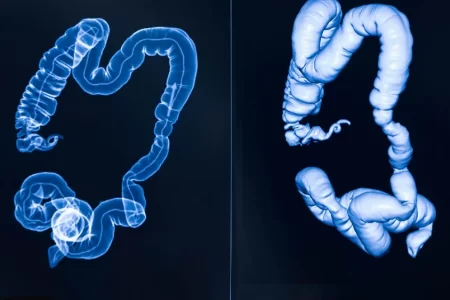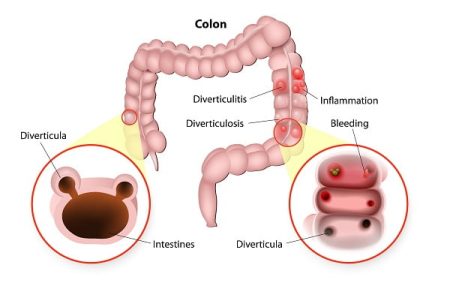
Diverticulitis is a condition of the gastrointestinal (GI) tract caused by bacterial infection in small pouches present in the large intestine. Symptoms take a few days after infection to show any visible effect and may vary with the severity of the disease. Following are the symptoms reported by the person suffering from diverticulitis.
Diverticulitis symptoms
- pain in the lower belly
- nausea or vomiting
- fever and chills
- constipation (or diarrhea)
- loss of appetite
Diverticulitis is characterized by sudden pain on the lower left side of the abdomen. The pain is quite severe and can get worse with time. The person suffering from diverticulitis may also feel tenderness in the abdomen with gas and bloat issue.
Another very serious symptoms associated with diverticulitis is rectal bleeding. Blood in the stool can be bright red, maroon or black-tarry in color. Sometimes the blood is present but not visible to eyes.
Rectal bleeding is a serious concern that should be immediately evaluated by the doctor. Rectal bleeding can be a symptom of many other serious complications like anemia, cancer, ulcers, hemorrhoids etc. With alternating diarrhea and constipation, the person suffering from diverticulitis may also experience painful cramps. Symptoms may last for few hours to several days.
Most people suffering from diverticulitis have no or mild symptoms which are not specific. This means that similar symptoms are seen in other “not-so-serious” digestive problems. This is the main reason people tend to ignore it. Only a trained healthcare professional with the help of proper clinical diagnosis can confirm about diverticulitis.
Read about diagnosis of diverticulitis.
Read about treatment of diverticulitis.
Diverticulitis, if taken lightly can cause serious complications like:
- Persistent fever
- Vomiting on eating any liquid or solid food
- Worsening abdominal pain
- Burning sensation during urination
- Bleeding from the rectum
- “Rabbit-pellet” like bowel movement
When To Seek Medical help?
A person should consult doctor or healthcare professional if he/she has any of the following symptoms:
- persistent abdominal pain
- persistent diarrhea or constipation
- unexplained fever
- recurring urinary tract infection
- persistent vomiting (not liquid or solid food tolerated)
The person should immediately take medical help in case he/she bleeds from the rectum. Even if the bleeding stops on its own, doctor should be consulted. If there is continuous bleeding or a lot of blood, the person should be immediately admitted to the emergency ward.






